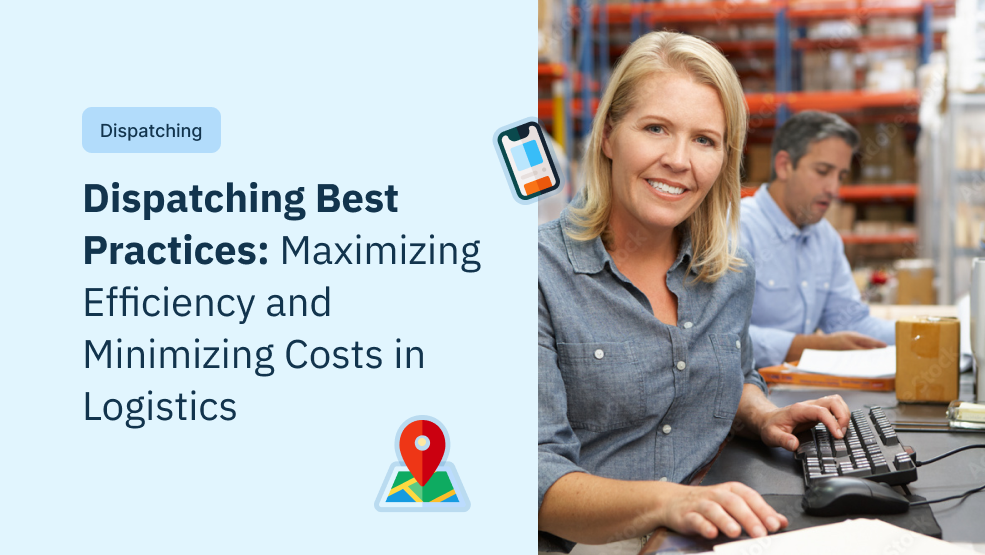We all know that logistics involves more than just delivering packages. It also involves managing scattered delivery drivers, keeping track of inventory, and addressing customer complaints. The pressure is real; making the wrong move could cost you a fortune.
As the owner of a logistics bus iness, maintaining balance is critical. Efficiency, cost, and customer satisfaction are all considerations—frequently in competition with each other. Every time a package is delayed, or a delivery window is missed because of inefficient routing, your reputation—and bottom line—is affected.
If you are scouring the interwebs for ways to optimize your logistics management, then you are in the right place. In this article, we discuss the importance of dispatching logistics to your business benefits. Read on to find out more.
What is dispatching in logistics?
Dispatching logistics is the process of planning, organizing, and managing the movement of goods from their origin to their destination. It involves carefully planning schedules and routes while also tracking important metrics such as mileage, fuel consumption, and the actual vs estimated time it takes to get from point “A” to point “B.”
Maintaining effective dispatching practices helps you ensure a continuous and consistent delivery schedule to make meeting deadlines and SLA requirements possible. This is a complex task that requires careful planning of delivery schedules and managing a highly skilled team. Here is where the role of the dispatcher comes into play.
A dispatcher is a person responsible for managing the entire delivery process from start to finish. They coordinate logistics with drivers and customers to ensure deliveries are made efficiently and on time.
What is the role of a dispatcher?
There are several tasks that a dispatcher performs to ensure the seamless delivery of goods:

Tracking drivers and delivery schedules
Logistics Dispatchers use sophisticated GPS and other tracking software to monitor the whereabouts of drivers at all times. Dispatchers monitoring drivers in real-time enables them to plan the best routes and keep everyone informed of any issues that may arise unexpectedly.
Communication with drivers and customers
A dispatcher facilitates easy communication between drivers and customers. They advise drivers of any pick-up or delivery instructions from the customer, and they provide reliable updates to customers concerning drivers’ timelines.
Managing routes efficiently
Dispatchers must plan the best routes and determine the most efficient loads for the drivers at their disposal. Developing the most optimal allocation of resources for deliveries is crucial to remaining cost-effective. Dispatchers must also acquire any documents and permits that drivers may need on their routes, such as when shipping chemicals, livestock or other materials that require particular documentation.
Solving logistical problems
Unforeseen circumstances may arise in the delivery process that could cause unexpected delays. These situations could lead to scheduling conflicts and inconvenience customers. To avoid potential problems, the dispatch team must be aware of considerations such as:
- All the major thoroughfares
- Height and weight restrictions
- Any roadwork and construction in progress
- Weather and road conditions where their drivers and customers operate
This awareness enables dispatchers to mitigate risks by proactively finding solutions and proposing alternative routes.
Maintaining customer relationships
Dispatchers are instrumental in developing good relationships with customers and with drivers. Customers come to rely on the proactive support that dispatchers provide, and this helps build trust and promote loyalty. The timely assistance and consistent responsiveness that dispatchers can offer also help maintain positive customer experiences and interactions when communicating delays.
Maintaining driver relationships
Dispatchers for delivery foster good working relationships with drivers, as well. This goes a long way towards successfully negotiating long working hours and exacting delivery schedules with drivers. Retaining reliable drivers and keeping them safe and happy is critical for successful transport operations, especially now during significant driver shortages.
How does dispatching software streamline logistics and boost efficiency?
The American trucking industry was slow to adopt new technologies when dealing with dispatching. Relying on outdated systems and tools, like paper maps, made navigation difficult and inefficient. But, with the introduction of new technologies, like dispatching software, the logistics business has undergone tremendous change—today’s dispatch systems have helped them revolutionize how goods get delivered.
You no longer have to depend on manual paperwork and phone calls to manage your fleet. With advanced dispatching software, you can easily automate processes and make your whole business more efficient. This means faster deliveries, happier customers, and much less stress for everyone. In short, dispatch software has helped move the industry into a new era of efficiency and innovation.
Let’s learn more on how modern dispatching systems have changed the way in which a business operates:

Streamlining operations for a seamless workflow
Before the age of automation, the entire dispatching process relied on spreadsheets and phone calls, from tracking packages to managing deliveries. With the introduction of dispatching software, that’s not the case anymore. You can manage your entire dispatching process from one centralized platform.
Now, easily streamline tasks like job assignments, route planning, and real-time tracking of shipments—removing endless scrolling through spreadsheets and calls to customers. This not only minimizes the risk of errors but also puts your business on the right path and keeps your whole operation running smoothly.
Simplifying task management
Dispatching software lets you manage your logistics operations better.
You can keep track of your fleet in real time and precisely see what they are up to. Dispatching software allows you to:
- Make decisions on the fly: Stuck in traffic? No problem! Dispatchers can adjust routes and schedules in real-time to keep deliveries on track.
- Be a hero: Need to send help fast? Real-time tracking allows for quick responses to emergencies, keeping everyone safe on the road.
- Keep customers in the loop: No more guessing games about when that package will arrive. Accurate ETAs tell customers exactly when to expect their deliveries, keeping them happy and informed.
- Avoid roadblocks: Traffic jams and accidents are no match for real-time routing. Dispatchers can adjust routes to avoid delays and ensure deliveries get there on time, every time.
Communication and collaboration
Traditionally, managing a logistics business involves navigating through endless spreadsheets and constantly worrying about misplaced orders and missed deliveries. With the introduction of dispatch management software, custom workflows can be tailored to your specific operational needs. Vehicle tracking and resource allocation can all be automated, and reports and analytics can be prepared at the touch of a button. These smoother operations allow you to focus on delivering exceptional customer service while reducing stress.
Ensuring compliance and driver’s well-being
Remember those long hours you spent filling out paper logs and worrying about breaking regulations? Well, those days are gone, thanks to field service management software (FSM). This allows you to track mileage and breaks, ensuring everyone stays safe and follows the rules.
They also help you streamline the dispatching process, giving drivers and dispatchers real-time data on the go. This not only makes record-keeping a breeze but also helps prevent driver fatigue by keeping an eye on hours and ensuring everyone gets the rest they need. So, the next time you see a truck on the road, remember that there’s a little high-tech magic helping to not only keep things efficient but also to make sure things are safe.
Keep customers informed and satisfied
Gone are the days of customers calling in a panic, wondering where their shipment is. Dispatch software helps you to keep your customers informed. Thanks to real-time tracking, dispatchers can see exactly where each truck is, providing customers with accurate estimated arrival times.
No more guessing games! Plus, improved two-way communication between drivers and dispatchers means any issues are addressed quickly and efficiently, keeping everyone informed. This all adds up to a level of transparency and service quality that was simply impossible with previous methods. It’s like having a dedicated team behind the scenes working tirelessly to ensure your customers get their deliveries on time, every time.
6 benefits of using dispatch management software in logistic business
The benefits of delivery dispatchers have far-reaching effects on your bottom line and are instrumental in running any successful logistics operation. The advantages of dispatchers include:

1. Boosting efficiency
Dispatch delivery teams are like the quarterbacks of the logistics game. They help you figure out the best way to divvy up deliveries among drivers and plan smart routes to save time and money. It’s like having a playbook for success that keeps things moving quickly and efficiently.
Dispatching plays a pivotal role in logistics. They help you allocate resources efficiently, ensuring optimal distribution among drivers. Using dispatch management software, you can optimize the most fuel-efficient routes that minimize deadhead miles—contributing to the overall efficiency of the logistics operation. This not only saves time but also maximizes the utility of available resources, ultimately enhancing the productivity of the entire delivery process.
2. Lowering costs
Efficiency isn’t just about getting things done faster; it’s about saving your hard-earned money from going into ruts. You can cut costs even more with dispatch delivery services. There is no need to stress about training, benefits, or handling turnover—let the software do the heavy lifting for you, and you can focus on what matters the most.
Efficient operations help you optimize how your resources are spent by tracking every movement and cutting down on the unnecessary.
3. Providing great customer service
In today’s internet era, making customers happy is a real deal. Dispatchers ensure everyone knows what’s going on with the delivery so your customers stay in the loop. Quick responses to questions and solving any issues pronto – that’s the kind of customer service that keeps them returning for more.
Dispatchers contribute to exceptional end-to-end transparency in the delivery process, addressing a critical pain point in the logistics business. By monitoring background activities and promptly responding to customer inquiries, dispatchers ensure a seamless customer experience. This quality customer service not only leads to customer satisfaction but also fosters client retention, creating a solid foundation for business growth.
4. Monitoring regulatory compliance
Let’s be honest: navigating the maze of legal regulations in the logistics world can make your head spin. Dispatch services are like having your own in-house legal team dedicated to keeping your deliveries running smoothly. They’re all about the details, from ensuring your trucks aren’t overloaded to ensuring hazardous materials are handled safely and everything in between. They even keep an eye on driver hours of service to avoid any unwanted fines and keep everyone safe on the road. Think of it as a proactive approach that prevents headaches down the line, allowing you to focus on what matters most – getting your deliveries where they need to be, on time, and hassle-free.
Most business owners and executives do not have the time or resources to keep a close eye on drivers’ day-to-day activities. Dispatchers know all the legal regulations regarding freight movement, such as limitations on gross load, transporting hazardous materials, or hours of service.
A dedicated dispatch team also has the specialized tools needed to monitor drivers’ daily activities effectively for any errors or violations. This helps drivers to stay compliant at all times to protect their safety and avoid hefty fines.
5. Increased productivity
Let’s face it: paperwork and phone calls can bog down even the best logistics business. Dispatch services are like having an extra pair of hands to handle all your field service operations. With dispatch management, you can streamline your operation from start to end. You can easily pinpoint the location of drivers, keep track of every inventory, and even collect payments on-site. This frees up your drivers to do their best – get behind the wheel and deliver the goods! Not only does this boost your drivers’ productivity, but it also creates a smoother experience for both your business and your customers.
6. Allowing scalability
Ever feel like your business is stuck in one gear? Dispatch services can be the key to shifting things into high gear and helping you grow. They do this by saving you money on logistics, keeping your customers happy, and ensuring your operations run smoothly. Think of them like a growth engine – they can handle a more extensive fleet, more deliveries, and even changing shipping needs, making scaling your business a breeze, not a headache. So, if you’re ready to take your business to the next level, dispatch services might be the answer you’ve been looking for!
Conclusion
Implementing a robust dispatching system like Zuper FSM can revolutionize logistics operations. Zuper FSM empowers you with features like real-time tracking, optimized route planning, and efficient communication, ultimately leading to:
- Increased Efficiency: Streamline workflows, optimize resource allocation, and minimize wasted time and fuel.
- Reduced Costs: Lower operational expenses through efficient route planning and driver management.
- Enhanced Customer Service: Provide real-time tracking updates and proactive communication for exceptional customer experiences.
- Improved Compliance: Ensure adherence to legal regulations and safety standards.
- Boosted Productivity: Automate manual tasks, free up drivers’ time and empower them to focus on deliveries.
- Scalability: Adapt to growing business needs and seamlessly manage a larger fleet and more deliveries.
Ready to unlock the potential of Zuper FSM and transform your logistics operations? Schedule a free demo today!





